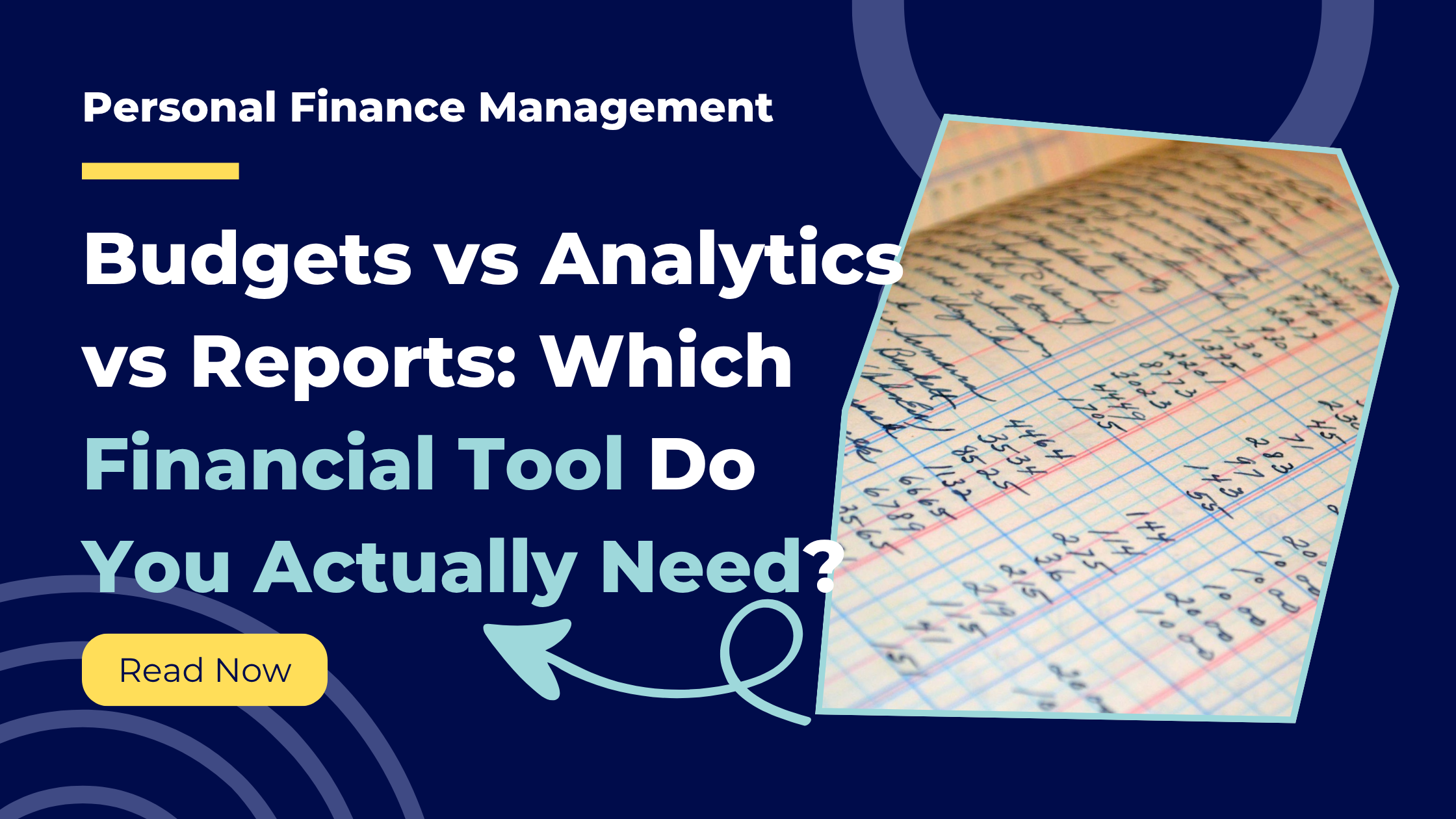
•
1 min read
Why Scheduled Financial Reports Are the Key to Money Clarity (Not More Willpower)
Discover how automated, scheduled reports eliminate financial blind spots and reduce money anxiety without spreadsheets or manual tracking.
You check your bank balance before making a purchase. The number looks fine. You buy. Three days later, you realise you forgot about the direct debit, the subscription, and the upcoming insurance payment. Sound familiar?
The problem is not that you are bad with money. The problem is that you are making financial decisions in the dark. Most people track their spending after the damage is done, not before. What you need is not more discipline. You need scheduled visibility.
In this post, you will learn why automated, scheduled financial reports are the missing piece in personal finance management, how they work, and how Fiscility delivers this clarity without spreadsheets or manual effort.
The Problem: Financial Decisions Are Made Without Context
Financial Blind Spots Cost You More Than You Think
According to research from the Money and Pensions Service, 11.5 million UK adults have less than £100 in savings, and over 22 million do not feel confident managing their money. The root cause is not income. It is visibility.
When you make spending decisions without context, you operate on assumptions. You assume you have enough. You assume last week was typical. You assume nothing unexpected will happen. These assumptions compound into financial stress, overdraft fees, and reactive scrambling.
Memory Is Not a Financial Tool
Your brain is excellent at many things. Remembering the exact timing and amounts of 47 transactions across three accounts is not one of them. Yet most people rely on mental accounting to decide whether they can afford something.
This approach has three critical flaws:
Recency bias dominates. You remember yesterday's coffee but forget last Tuesday's grocery shop.
Irregular expenses vanish. Annual subscriptions, quarterly bills, and one-off purchases disappear from your mental model until they hit your account.
You lack forward visibility. Without knowing what is coming, you cannot make confident decisions about what is available now.
The solution is not better memory. It is better systems.
The Solution: Scheduled Reports Create Decision Confidence
What Scheduled Financial Reports Actually Do
A scheduled financial report is a snapshot of your financial position delivered automatically at a set frequency. Daily, weekly, or monthly. It shows you what happened, what is happening now, and what is likely to happen next.
This is not about tracking every penny. It is about having the right information at the right time to make clear decisions.
The Three Layers of Scheduled Reporting
Layer 1: Daily Pulse Reports
These answer the most important question: "Can I afford this today?"
A daily pulse report shows your current cashflow, upcoming obligations, and discretionary spending capacity. It eliminates guesswork. You know exactly what is safe to spend without affecting your commitments.
Fiscility delivers daily pulse reports every morning, consolidating all your accounts into a single view. No manual input required.
Layer 2: Weekly Context Reports
Weekly reports reveal patterns. Are you trending over or under budget? Did an unusual expense occur? Are your spending categories shifting?
This layer prevents small issues from becoming large problems. You catch overspending in week one, not month four.
Layer 3: Monthly Strategic Reports
Monthly reports provide the big picture. Total income versus total spending. Category breakdowns. Savings rate. Burn rate if self-employed or between jobs.
This is where you assess whether your financial strategy is working or needs adjustment. Monthly reports turn reactive firefighting into proactive planning.
Why Automation Matters More Than the Reports Themselves
Manual Reporting Fails Because Life Happens
Most financial advice tells you to track your spending manually. Open your banking app. Export transactions. Categorise them. Build a spreadsheet. Update it weekly.
In theory, this works. In practice, it does not. Here is why:
You forget. Life gets busy. You skip a week. Then two. Suddenly your tracking system is three months out of date and worthless.
Even when you do it, manual reporting is backward-looking. You see what you spent last week, but you still do not know what you can spend today.
Automation solves both problems. Reports arrive whether you remember or not. They update in real time, not when you find time to open a spreadsheet.
Scheduled Delivery Creates Consistency Without Effort
The power of scheduled reports is not just automation. It is rhythm.
When reports arrive at the same time every day or week, you build a habit of reviewing them. You develop intuition about your numbers. You spot anomalies immediately because you know what normal looks like.
This consistency is the difference between data and insight. Data sits in your account. Insight appears in your inbox, ready to inform your next decision.
Fiscility schedules reports across daily, weekly, and monthly cycles. You choose the frequency. The system handles the rest.
What Good Scheduled Reports Look Like in Practice
Example 1: The Daily Morning Report
Imagine you wake up to this in your inbox:
Current Balance Across All Accounts: £2,847
Upcoming Commitments (Next 7 Days): £680
Discretionary Spend Available Today: £340
Cashflow Trend: Stable, up 8% from last week
You now know exactly what you can spend without compromising your obligations. No mental maths. No anxiety. Just clarity.
Example 2: The Weekly Spending Review
Every Sunday, you receive a breakdown:
This Week's Spending: £287
Vs. Average Weekly Spend: £310 (7% under)
Top Category: Groceries (£94)
Anomaly Detected: One-off purchase at IKEA (£63)
This tells you two things: you are trending slightly under budget, and the IKEA purchase was irregular. No action needed, but you have context if next week looks different.
Example 3: The Monthly Strategic Summary
At month-end, you see:
Total Income: £3,200
Total Spending: £2,680
Savings Rate: 16.25%
Largest Category: Housing (£950)
Burn Rate (If Income Stopped): 4.2 months based on current savings
This view tells you whether your financial strategy is sustainable. If your savings rate is dropping or your burn rate is shrinking, you adjust before it becomes a crisis.
The Psychology of Scheduled Reports: Why They Reduce Financial Anxiety
Visibility Always Beats Uncertainty
Financial anxiety does not come from spending. It comes from not knowing whether your spending is safe.
When you lack visibility, every purchase triggers a small calculation: "Can I afford this? Will this cause a problem later?" Even small decisions carry weight.
Scheduled reports eliminate this mental load. You know your numbers. You know your capacity. You make decisions with confidence, not fear.
The Compound Effect of Daily Awareness
One report will not change your financial life. But daily awareness compounds.
When you see your numbers every morning, you develop an intuitive sense of your financial position. You notice patterns. You catch mistakes immediately. You stop wondering and start knowing.
This awareness does not require discipline. It requires consistency. Scheduled reports deliver that consistency automatically.
How Fiscility Automates Scheduled Reporting
Connected Accounts, Zero Manual Work
Fiscility connects to all your bank accounts, credit cards, and savings accounts via secure open banking integration. Transactions sync automatically. No exports. No spreadsheets. No manual entry.
Intelligent Categorisation and Forecasting
The platform categorises transactions automatically and learns from your behaviour. It identifies recurring expenses, predicts upcoming bills, and flags anomalies.
This means your reports are not just historical summaries. They include forward-looking context: what is coming, what is available, and what you should watch.
Customisable Schedules and Delivery
You choose the frequency: daily, weekly, monthly, or all three. Reports arrive via email or in-app notifications. You review them when convenient.
Fiscility does not require you to log in daily. The insights come to you.
Multi-Account Consolidation
Most people have multiple accounts: current account, savings, credit card, joint account. Fiscility consolidates all of them into a single view.
You see total cashflow, total obligations, and total capacity. No switching between apps. No mental addition. Just one clear number.
Key Takeaways
Scheduled financial reports are not about tracking every transaction. They are about having the right information at the right time to make confident decisions.
Daily reports answer: Can I afford this today?
Weekly reports answer: Am I on track or drifting off course?
Monthly reports answer: Is my financial strategy working?
Automation is essential because manual reporting fails when life gets busy. Scheduled delivery creates consistency without effort.
Visibility reduces financial anxiety. When you know your numbers, you stop guessing and start deciding.
Fiscility automates the entire process. Connected accounts, intelligent forecasting, and scheduled delivery mean you get clarity without spreadsheets or manual work.
How Fiscility Helps
Fiscility was built to solve one problem: financial blind spots.
The platform automates daily, weekly, and monthly reports across all your accounts, giving you the visibility needed to make confident financial decisions without guesswork or manual tracking.
You stop wondering if you can afford something. You know.
Try Fiscility free for 7 days and see how scheduled reporting changes your relationship with money: Start Your Free Trial
Summary
Clarity is not about having more data. It is about having the right data, delivered consistently, without effort.
Manual tracking fails because it depends on memory and discipline. Scheduled reporting succeeds because it depends on systems and automation.
That is what Fiscility was built to deliver: consistent financial visibility that creates decision confidence, reduces anxiety, and eliminates blind spots.
Found this helpful? Share it with others!
Ready to take control of your finances?
Join Fiscility today and start your financial journey.
Apply for a Membership

